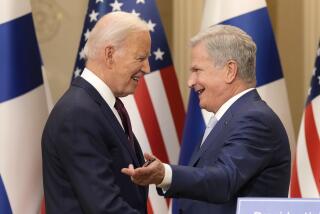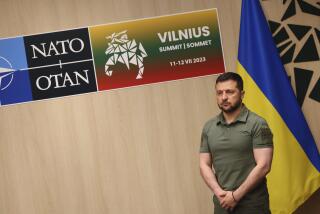Helsinki Can Be the Cure for Yalta
- Share via
Outside of strategic, political and diplomatic aspects of the two major agreements by the United States with the Soviet Union in 1945 at Yalta and with Russia in 1997 at Helsinki, there is another side often overlooked by the principals: the human dimension.
The European continent has been constantly subject to powerful political winds, its eastern and central parts usually in the heart of the storm. Yalta, that solidified Churchillian Iron Curtain, pushed Poland, Czechoslovakia, Hungary and others to the East. All of them were desperately clinging to the opposite direction. Most of them had solid Western roots.
Poland, throughout her turbulent history, was influenced by a series of French kings and a brief encounter with Napoleon. The Catholic Church permeated the religious life. In addition, the Yalta Agreement reinforced historical animosity between Russia and Poland.
Czechoslovakia, a state created in the aftermath of the Versailles Treaty, never felt close to the Soviet Union. Its cultural background had roots in Protestant religious and social philosophy. Its political system developed along the Western parliamentary model. As a result, the country first to fall victim to Germany’s aggression and England’s mood of appeasement was viewed during the 1920s and 1930s as the most politically advanced nation of the region.
In human terms, Yalta forced millions of Central and Eastern Europeans into a doubly hostile environment of Soviet control and occupation and communist authoritarianism. This latest Helsinki agreement, which is just the beginning of a process, gave Poles and Czechs a sense of taking a first step toward returning home. All of them were desperately longing to be told that they belong to the West. Membership in NATO will be the first tangible proof of Western acceptance of that belonging. This is where the human dimension of the Helsinki pact comes out dramatically. Polish, Czech and Hungarian faces are turning West not as observers, not as poor relatives, but, in the not-too-distant future, as full participants. The old sense of inferiority to more advanced parts of Europe is bound to dissipate in both political and economic terms. In addition, NATO membership is bound, in time, to create a sense of military comradeship: New and old members will share the same barracks and the same sense of purpose.
The consequences of Yalta were the involuntary movement of masses of people forcibly uprooted from their homes. They caused deportations to Arctic Soviet regions of men and women whose only crime was their allegiance to Western powers and their service in Allied armies. Helsinki’s results are aimed at healing those wounds. Should Russia, under the newly revived leadership of Boris Yeltsin, understand the nature of the evolving relationship between the former satellites and Moscow, mutual animosity gradually would be replaced by a businesslike pragmatism.
This could influence Moscow’s attitude toward the expansion of NATO, allowing Russian leaders to see in the new NATO not a threat but a security belt for Russia. None of the new NATO members will harbor hostile plans toward Moscow. In return, it will be up to Russia to demonstrate understanding and respect for its Western neighbors. Once such a mutual relationship develops, once the first step is made toward restructuring the European security system past imperial designs of the former Soviet Union, the memory of human suffering and political inequality is apt to be replaced by a new spirit of mutual cooperation initiated by the Helsinki agreement.
The process started in Finland, it is hoped, can lead toward gradual erosion of the painful image of Yalta. Still, there are fears in some of the capitals of former Soviet satellites that America was willing once again to appease Russia. Within the negotiating process, both sides have been accused by their hardline opponents of giving up too much too fast. But there is no question that a new window of great opportunity--membership in the revamped security system--has been opened. In 1945, that window was shut firm. Helsinki forced its opening, with Russia grudgingly going along.
More to Read
Sign up for Essential California
The most important California stories and recommendations in your inbox every morning.
You may occasionally receive promotional content from the Los Angeles Times.










